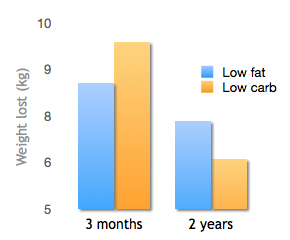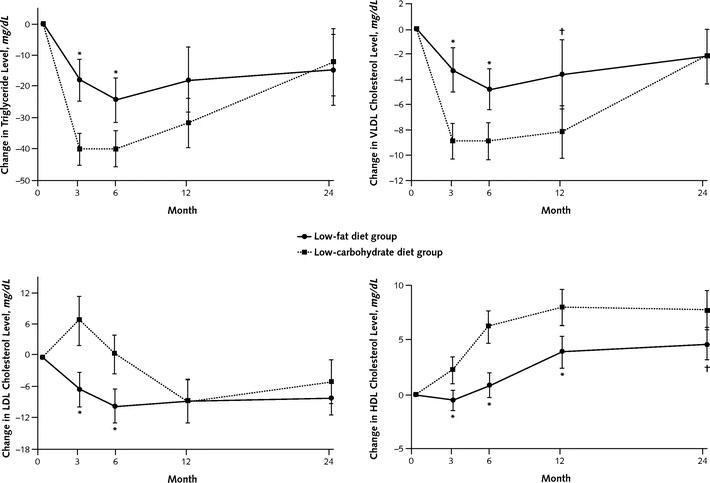Western society has lipophobia – fear of fat.
How else can you explain your co-worker chomping on a low-fat neon pink cloud of cotton candy and sucking down a Coke while exclaiming, “Don’t you know avocados are high in fat?” as you’re eating your chicken, spinach, and avocado salad with olive oil dressing.
Gee, I’ll take my chances with the avocado.
I’m not advocating bacon and salami with two slabs of lard, but rather good sources of fat, such as avocados, walnuts, coconuts, olive, and fatty fish like salmon.
I thought we’d gotten over this nonsense of avoiding fat, but lately I’ve seemed to be surrounded by anti-fat proponents. Let’s look at the evidence.
Low-fat and low-carbohydrate diets: What do we know so far?
A few years ago there was a paper published that compared five different studies to figure out what we really know about low-fat and low carbohydrate diets (1).
Most studies of low-fat diets allowed up to 30% of daily calories to come from fat, with one study having a very low-fat diet (<10% daily calories from fat). Studies with low-carbohydrate diets limited carbohydrates to 20 grams/day.
After comparing and summarizing five studies with 447 dieters, the conclusion was that low-carbohydrate, non-energy-restricted diets are at least as effective as low-fat energy-restricted diets after 1 year.
Translation: If you eat vastly fewer carbs, you don’t have to pay all that much attention to your total calories to lose as much weight as you would if you counted your calories and your fat. That being said, you can’t be eating pounds of butter and expect to be skinny.
Well, that’s a useful start. But what about long-term outcomes? Glad you asked!
Research question
This week I review a brand new study that compared low-carbohydrate and low-fat diets for two years.
Foster, GD, et al. Weight and metabolic outcomes after 2 years on a low-carbohydrate versus low-fat diet: a randomized trial. Ann Intern Med. 2010 Aug 3;153(3):147-57.
Methods
The researchers wanted to figure out which diet — low-fat or low carb — was best for long-term weight loss and general heart health.
First they found 307 volunteers that were in their mid-forties and obese (BMI>30 kg/m2). Anybody that had type 2 diabetes and/or high blood pressure, or was taking medications for obesity or cholesterol was left out of the study. Basically, people who were healthy as possible for being obese were included in the study.
Half the volunteers were assigned to the low-fat diet (154 volunteers) and half were on a low-carbohydrate diet (153 volunteers).
Low-carbohydrate diet
Volunteers in the low-carbohydrate diet group were told to eat 20 grams of carbohydrate (which is 80 calories) a day, all from low-glycemic index vegatables. Asparagus, broccoli, Brussel sprouts, spinach and celery are low glycemic index vegatables (under 20).
No fruits, no breads, no pasta, no high glycemic vegetables (carrots, corn, potatoes, squash, sweet potato) were permitted, but there was no focus on reducing calories. Volunteers were told to eat foods high in protein and fat until they were satified. These guidelines are based on Dr. Atkins’ New Diet Revolution phase 1, in which carbohydrates are limited to 20 grams.
After 12 weeks, carbohydrates were added back at the rate of 5 grams/day each week. Week 13 would allow 25 grams of carbs/day, week 14 went up to 30, etc. by adding more vegatables, some fruit and some grains. These same reccommendations were part of the Atkins diet guidelines.
Low-fat diet
While the low-carb diet focused on carbohydrates, the low-fat diet focused on calories. Since fat has the most calories per gram (9 calories/gram), by limiting fat you can drop calories compared to protein and carbohydrates (both 4 calories/gram).
Female volunteers were told to eat between 1200-1500 calories a day, while the men were to eat 1500-1800 calories a day.
Calorie breakdown was:
- 55% calories from carbohydrates
- 30% calories from fat
- 15% calories from protein
There was exercise…kinda
Most diet studies don’t have any exercise in them, so you end up getting people losing 10 pounds (about 5 kg) in a year.
In this study, the volunteers did some exercise that started in week 4 with 4 sessions per week. Exercise was mostly 20-minute sessions of walking. By week 19, everbody worked up to 4 sessions a week lasting 50 minutes (3 hours and 20 minutes total, so still under JB’s baseline of 5 hours/week recommendation).
Keeping everybody on track
Two years is a long study time.
There were check-ins 3 months, 6 months, a year and two years into the diets to check body composition (percent bodyfat), blood work, blood pressure and overall weight.
Since the study period was so long, there had to be some way to keep all the volunteers on track, so the researchers had all the volunteers come in as a group:
- every week for the first 20 weeks, then
- every two weeks for the next 20 weeks, and then
- every second month for the rest of the study.
During these get-togethers the group talked about behavioural treatments like self-montoring, what to do when you slip up, and how to deal with temptation.
Results
Body weight
In the first 3 months the low-carbohydrate group lost just under 10 kg (9.49 kg, 20.9 pounds) on average. The low-fat diet group did pretty well too, but lost less — they lost 8.37 kg (18.5 pounds).
From 6 months onward, there was no real difference in body weight lost between the two diets. Both groups slowly regained weight to end up with a total of 7 kg (15.4 lb) lost after 2 years in both groups. Not exactly a success story about weight loss.

Both groups lost the same proportion of amount of body fat and lean mass. Yup, just over 2 kg of that 7 kg weight loss is lean mass.
Cardiovascular disease risk factors
In the first 6 months, the low-carb dieters had decreased cardiovascular disease risk with lower triglycerides, VLDL, and higher HDL, with the only increase risk factor being increased LDL.
Meanwhile, the low fat dieters didn’t see as many improvements in triglyceride nor VLDL. There was a tiny improvement in HDL, but not as much as the low-carb group.
| Low-carb | Low-fat | |
|---|---|---|
| Triglycerides | -40.06 mg/dL | -24.40 mg/dL |
| HDL | +2.30 mg/dL | +0.89 mg/dL |
| LDL | +0.54 | -9.52 mg/dL |
| VLDL | -8.88 mg/dL | -4.79 mg/dL |
After a year, though, triglycerides and LDL were the same for both groups, and by 2 years VLDL was the same for both groups.
Hmm, so after 2 years on low-carb or low-fat diet the groups had the same weight loss, triglyceride, VLDL and LDL improvements, so it’s a tie! Right?
Well, after 2 years the low-carb diets had higher HDL, which means that the low-carbohydrate diet in this study was marginally better in decreasing cardiovascular disease risk. As the researchers note, “The low-carbohydrate diet group had greater increases in high-density lipoprotein cholesterol levels at all time points, approximating a 23% increase at 2 years… A low-carbohydrate diet is associated with favorable changes in cardiovascular disease risk factors at 2 years.”
Blood pressure and bone density
Sometimes if you’re going to do a two year study you throw in a few more tests just because… well, it’s two years and you might as well get as much info as you can.
There was no difference in hip bone and spine density between dieters, and the exercise program didn’t improve densities after 2 years either. All in all, dieting (low carb or low fat) and walking don’t improve bone density.
A couple of interesting things came up with the blood pressures.
The diastolic (the second lower number from your doctor) in the low-carb dieters was lower than in the low-fat dieters after the 2 years. And low-carb dieters had lower systolic blood pressure (the first bigger number from your doctor) in the first 3 months.
Finishing the program
Two years is a long time to be in a study and even if you’re not in a study, it’s important that people stay on a diet to be successful.
Even though many critics of a low carb diet say that people can’t stay on it long term, in this two year study there was no difference in how many people dropped out between diet groups. Low-carb and low-fat groups had a 42% and 32% drop out rate (though different, not enough to be considered statistically different).
Conclusion
For years experts said that fat made you fat and that turned out to be wrong. As you can see in this study, you can lose weight without reducing fat. Granted, 7 kg of weight lost after two years isn’t fantastic.
The next argument was that any weight loss from low-carb diets would be loss of muscle and liver carbohydrate (glycogen) and water, so there was no long term weight loss. Again that was disproven in this study and a few others.
Yet another argument against low-carb diets was that people couldn’t stay on them long term because they were too restrictive, but in this study there was not much difference in dropout rates between low-fat and low-carb dieters.
The last cry from the experts was that low-carb diets wouldn’t improve cardiovascular disease risk factors, like LDL cholesterol, HDL cholesterol and triglycerides. In this study, when volunteers were eating the least amount of carbohydrates (the first 3 months) they had the lowest levels of VLDL cholesterol and triglycerides, while having increases in HDL cholesterol — all of which reduce cardiovascular disease risk.
Bottom line
Both diets end up pretty much the same in terms of weight loss and health, with one exception: HDL cholesterol. HDL cholesterol was higher in the low-carbohydrate group, so you have a good argument to go a low-carb diet to improve your blood lipid profile.
To watch a video of one of the researchers summarizing their work: http://www.annals.org/content/153/3/147/suppl/DC1
References
Click here to view the information sources referenced in this article.
Learn more
Want to get in the best shape of your life, and stay that way for good? Check out the following 5-day body transformation courses.
The best part? They're totally free.
To check out the free courses, just click one of the links below.





Share